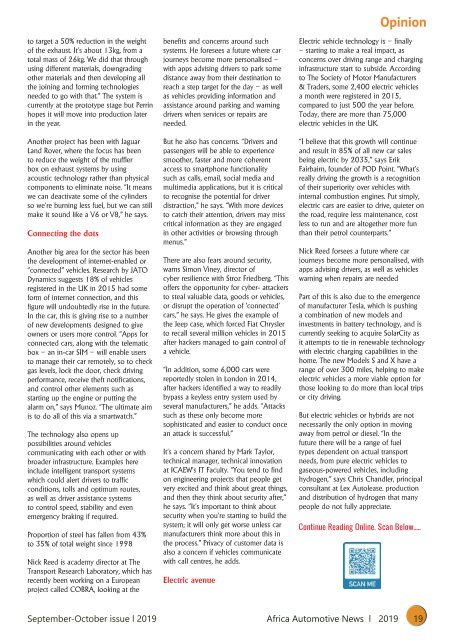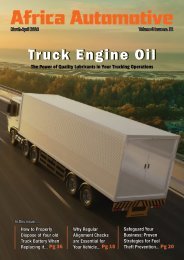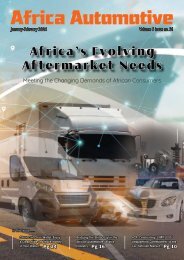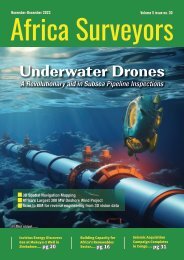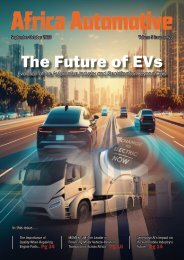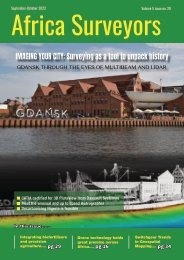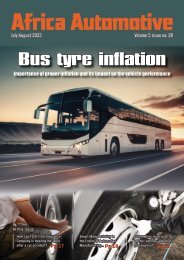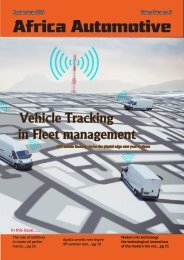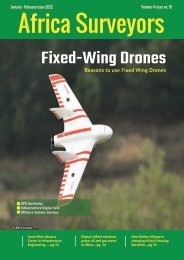Africa Automotive News September-October digital issue 2019
Africa Automotive prides itself to be the ONLY Africa’s leading and MOST authoritative magazine for the automotive industry in Africa with printed copies for the automotive industry decision makers in both government, NGO’s and private sector. The Bi-monthly magazine offers cost effective advertising services that get results and improves growth in the auto B2C and B2B sector, keeping an eye on latest technologies in Africa and across the world, the magazine predominately covers the developments in the Africa auto industry.
Africa Automotive prides itself to be the ONLY Africa’s leading and MOST authoritative magazine for the automotive industry in Africa with printed copies for the automotive industry decision makers in both government, NGO’s and private sector. The Bi-monthly magazine offers cost effective advertising services that get results and improves growth in the auto B2C and B2B sector, keeping an eye on latest technologies in Africa and across the world, the magazine predominately covers the developments in the Africa auto industry.
You also want an ePaper? Increase the reach of your titles
YUMPU automatically turns print PDFs into web optimized ePapers that Google loves.
to target a 50% reduction in the weight<br />
of the exhaust. It’s about 13kg, from a<br />
total mass of 26kg. We did that through<br />
using different materials, downgrading<br />
other materials and then developing all<br />
the joining and forming technologies<br />
needed to go with that.” The system is<br />
currently at the prototype stage but Perrin<br />
hopes it will move into production later<br />
in the year.<br />
Another project has been with Jaguar<br />
Land Rover, where the focus has been<br />
to reduce the weight of the muffler<br />
box on exhaust systems by using<br />
acoustic technology rather than physical<br />
components to eliminate noise. “It means<br />
we can deactivate some of the cylinders<br />
so we’re burning less fuel, but we can still<br />
make it sound like a V6 or V8,” he says.<br />
Connecting the dots<br />
Another big area for the sector has been<br />
the development of internet-enabled or<br />
“connected” vehicles. Research by JATO<br />
Dynamics suggests 18% of vehicles<br />
registered in the UK in 2015 had some<br />
form of internet connection, and this<br />
figure will undoubtedly rise in the future.<br />
In the car, this is giving rise to a number<br />
of new developments designed to give<br />
owners or users more control. “Apps for<br />
connected cars, along with the telematic<br />
box – an in-car SIM – will enable users<br />
to manage their car remotely, so to check<br />
gas levels, lock the door, check driving<br />
performance, receive theft notifications,<br />
and control other elements such as<br />
starting up the engine or putting the<br />
alarm on,” says Munoz. “The ultimate aim<br />
is to do all of this via a smartwatch.”<br />
The technology also opens up<br />
possibilities around vehicles<br />
communicating with each other or with<br />
broader infrastructure. Examples here<br />
include intelligent transport systems<br />
which could alert drivers to traffic<br />
conditions, tolls and optimum routes,<br />
as well as driver assistance systems<br />
to control speed, stability and even<br />
emergency braking if required.<br />
Proportion of steel has fallen from 43%<br />
to 35% of total weight since 1998<br />
Nick Reed is academy director at The<br />
Transport Research Laboratory, which has<br />
recently been working on a European<br />
project called COBRA, looking at the<br />
benefits and concerns around such<br />
systems. He foresees a future where car<br />
journeys become more personalised –<br />
with apps advising drivers to park some<br />
distance away from their destination to<br />
reach a step target for the day – as well<br />
as vehicles providing information and<br />
assistance around parking and warning<br />
drivers when services or repairs are<br />
needed.<br />
But he also has concerns. “Drivers and<br />
passengers will be able to experience<br />
smoother, faster and more coherent<br />
access to smartphone functionality<br />
such as calls, email, social media and<br />
multimedia applications, but it is critical<br />
to recognise the potential for driver<br />
distraction,” he says. “With more devices<br />
to catch their attention, drivers may miss<br />
critical information as they are engaged<br />
in other activities or browsing through<br />
menus.”<br />
There are also fears around security,<br />
warns Simon Viney, director of<br />
cyber resilience with Stroz Friedberg. “This<br />
offers the opportunity for cyber- attackers<br />
to steal valuable data, goods or vehicles,<br />
or disrupt the operation of ‘connected’<br />
cars,” he says. He gives the example of<br />
the Jeep case, which forced Fiat Chrysler<br />
to recall several million vehicles in 2015<br />
after hackers managed to gain control of<br />
a vehicle.<br />
“In addition, some 6,000 cars were<br />
reportedly stolen in London in 2014,<br />
after hackers identified a way to readily<br />
bypass a keyless entry system used by<br />
several manufacturers,” he adds. “Attacks<br />
such as these only become more<br />
sophisticated and easier to conduct once<br />
an attack is successful.”<br />
It’s a concern shared by Mark Taylor,<br />
technical manager, technical innovation<br />
at ICAEW’s IT Faculty. “You tend to find<br />
on engineering projects that people get<br />
very excited and think about great things,<br />
and then they think about security after,”<br />
he says. “It’s important to think about<br />
security when you’re starting to build the<br />
system; it will only get worse unless car<br />
manufacturers think more about this in<br />
the process.” Privacy of customer data is<br />
also a concern if vehicles communicate<br />
with call centres, he adds.<br />
Electric avenue<br />
Opinion<br />
Electric vehicle technology is – finally<br />
– starting to make a real impact, as<br />
concerns over driving range and charging<br />
infrastructure start to subside. According<br />
to The Society of Motor Manufacturers<br />
& Traders, some 2,400 electric vehicles<br />
a month were registered in 2015,<br />
compared to just 500 the year before.<br />
Today, there are more than 75,000<br />
electric vehicles in the UK.<br />
“I believe that this growth will continue<br />
and result in 85% of all new car sales<br />
being electric by 2035,” says Erik<br />
Fairbairn, founder of POD Point. “What’s<br />
really driving the growth is a recognition<br />
of their superiority over vehicles with<br />
internal combustion engines. Put simply,<br />
electric cars are easier to drive, quieter on<br />
the road, require less maintenance, cost<br />
less to run and are altogether more fun<br />
than their petrol counterparts.”<br />
Nick Reed forsees a future where car<br />
journeys become more personalised, with<br />
apps advising drivers, as well as vehicles<br />
warning when repairs are needed<br />
Part of this is also due to the emergence<br />
of manufacturer Tesla, which is pushing<br />
a combination of new models and<br />
investments in battery technology, and is<br />
currently seeking to acquire SolarCity as<br />
it attempts to tie in renewable technology<br />
with electric charging capabilities in the<br />
home. The new Models S and X have a<br />
range of over 300 miles, helping to make<br />
electric vehicles a more viable option for<br />
those looking to do more than local trips<br />
or city driving.<br />
But electric vehicles or hybrids are not<br />
necessarily the only option in moving<br />
away from petrol or diesel. “In the<br />
future there will be a range of fuel<br />
types dependent on actual transport<br />
needs, from pure electric vehicles to<br />
gaseous-powered vehicles, including<br />
hydrogen,” says Chris Chandler, principal<br />
consultant at Lex Autolease. production<br />
and distribution of hydrogen that many<br />
people do not fully appreciate.<br />
Continue Reading Online. Scan Below.....<br />
<strong>September</strong>-<strong>October</strong> <strong>issue</strong> l <strong>2019</strong><br />
<strong>Africa</strong> <strong>Automotive</strong> <strong>News</strong> l <strong>2019</strong> 19


